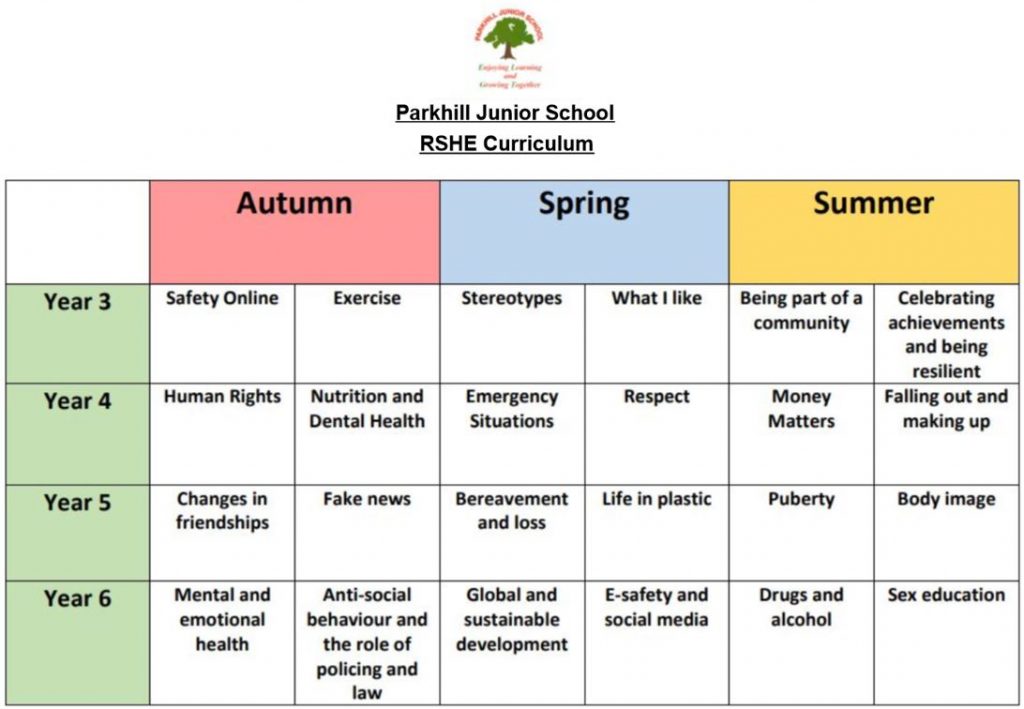Update on Relationships, Sex and Health Education
As of September 2020, the Department for Education (DfE) introduced compulsory Relationships, Sex and Health Education for Primary Schools. These subjects are now statutory which means that parents no longer have the right to withdraw their children from these lessons.
Today’s children and young people are growing up in an increasingly complex world and living their lives seamlessly on and offline. This presents many positive and exciting opportunities, but also challenges and risks. In this environment, children and young people need to know how to be safe and healthy, and how to manage their academic, personal and social lives in a positive way.
This is why the DfE have made Relationships, Sex and Health Education compulsory in all primary schools in England and Relationships, Sex and Health Education compulsory in all secondary schools, as well as making Health Education compulsory in all state-funded schools.
However, it is important to note that the curriculum hasn’t really changed from what we, at Parkhill, have been teaching for the past few years. The main change is that it is now compulsory.
Relationships Education includes:
- Families and people who care for me
- Caring Friendships
- Respectful Relationships
- Online Relationships
- Being safe
Health Education includes:
- Mental wellbeing
- Internet safety and harms
- Physical health and fitness
- Healthy eating
- Drugs, alcohol and tobacco
- Health and disease prevention
- Basic First Aid
- Changing adolescent bodies
Sex Education will continue to be taught as it always has at Parkhill: In line with the National Curriculum, adapted to meet the needs of our children and with a view to safeguard the children with no opinion or agenda. This continues to be non-statutory although we do highly recommend that the children receive this education at school as it ensures clarity, age appropriate content and factual information (rather than misinformation from other sources).
Relationships, Health and Sex Education at Parkhill
As experienced practitioners, we have created a curriculum based on curriculum guidance, knowledge of our pupils and community and our expertise following years of planning and teaching sex and relationships education. We plan to educate the children with knowledge that will not only educate them about their changing bodies, but to equip them with the skills to safeguard them against potentially harmful situations, the confidence to say no to scenarios they are uncomfortable with (understanding the meaning of consent) and respect for themselves and others. All of this will be taught at an age appropriate level where the children will not be taught more than they need to know.
At Parkhill, we use a combination of National Curriculum outcomes, the Redbridge approved scheme of work and a programme called My Life (see examples) to create a comprehensive Parkhill curriculum with structured progression so children build up their understanding of health, relationships, safety and social issues in age-appropriate steps. Personal development of important qualities such as resilience, responsibility and wellbeing is also embedded. Teachers have regular CPD (Continued Professional Development) to keep their subject knowledge up to date and to ensure they are confident and accomplished with delivering these lessons.
If you have any questions about Relationships, Sex and Health Education, then please speak to your child’s class teacher or to Ms Gurjeet Uppal (Duty Headteacher)
Further guidance can be found in the following DfE document and our Parkhill RSHE policy (links below)
RSHE parent consultation outcomes
Sample RSHE resources have been available on our website since 18th May 2021. We completed our parent consultation between the 11th and 23rd June. Written and electronic correspondence has gone out to parents inviting them to view the resources and take part in the consultation. The deadline for this has now closed.
Outcomes of Wave 2 Parent’s Consultation (school led)
- Sample RSHE planning and resources have been shared on the school website,
- A letter was sent inviting parents to take part in the RSHE survey. Two copies were sent out electronically and one copy sent home with the children. The deadline was also extended to encourage more parents to participate,
- 23 parents (of 420) participated in the parent survey altogether,
- The majority believed Redbridge’s draft policy met it’s aims,
- The majority believed that the policy was fully inclusive. Those that disagreed (12 parents) felt that sex education or LGBTQ+ relationships should not be taught at all as it conflicted with their religious views,
- The majority felt that the curriculum content was fully appropriate. Those that felt it wasn’t appropriate (10 parents) disagreed with sex education or LGBT relationships being taught at all as it conflicted with their religious views,
- The majority (15 parents) were pleased that their children were learning about different aspects of relationships. Four parents were unsure. Four parents were not pleased their children were learning about different aspects of relationships (such as friendships, bullying, teamwork and consent),
- The majority of parents fully or partially appreciated the benefit of children being taught about relationships and acknowledged the link to safeguarding. Two parents stated that they do not appreciate it,
- Four of the twenty-three participants had attended the Highlands Parent Forum- advertised by the borough and Parkhill- inviting opinions on their consultation about the curriculum and content,
- The majority of participating parents felt that they do not require further support from the school.
Where we have received correspondence from parents regarding their concerns about the implementation, we have responded thus:
| Parental concern | Our view | Action taken |
| Children should not be taught in mixed sex classes for RSHE. | As a Rights’ Respecting school, we believe it to be important for the children to be taught that they are equal to one another. Dividing the children into single-sex groups for only one subject, we feel, highlights their differences and may lead to them feeling ashamed or embarrassed about their changing bodies. This may lead them to being reluctant to speak of any concerns to a member of the opposite sex- including their parents or teachers. | Despite our view, we understand that this is a contentious point amongst some of our parental community. We believe these lessons to be essential to each child’s development that we are prepared to concede to single-sex teaching in sex education (Y6 only) if it means that the children are able to access the lessons rather than having their parents remove them. |
| The children are too young to be taught about sex and it should not be included in the curriculum. | Children at primary age are exposed to much more than we realise through media, television and social media. Our experienced teachers know that this leads to misconceptions and access to age-inappropriate content being accessed by the children. We teach from an age-appropriate curriculum, not telling children any more than they need to know at this age in a safe, factual environment. Our only aim is to educate (age-appropriately) and safeguard. | The revised National Curriculum instructs sex education to be taught in Y6 only. Parents retain the right to withdraw their children from these lessons if they wish.
|
| The children are too young to be taught about puberty. | It is completely normal for children to go through puberty between the ages of 8-14. This means that menstruation can begin at Year 3. We believe it is essential that the children know and understand the changes puberty will have on their bodies and mental wellbeing so that they are fully prepared- when the time comes. | Teaching children about puberty becomes statutory as of September 2021- which means parents cannot withdraw their children from these lessons.
Parents have had the opportunity to contribute to the Redbridge consultation this past year to express their views regarding syllabus content. |
| The children should not be taught the scientific names for private parts in Year 3. | Children are taught the scientific names for private parts from Early Years. This is for two reasons: using the correct terms often removes the embarrassment (for example, if a child was injured and needed to explain where they were hurt) and it safeguards the children. Knowing ‘private parts’ are to be kept private helps children to know if something is inappropriate. | Teaching children about puberty becomes statutory as of September 2021- which means parents cannot withdraw their children from these lessons.
Parents have had the opportunity to contribute to the Redbridge consultation this past year to express their views regarding syllabus content. |
| The children should not be taught about LGBTQ+ relationships as it conflicts with some parents’ religious beliefs. | As a Rights’ Respecting school, we teach our children to be inclusive, tolerant and accepting of all to prepare them for life in modern Britain and the wider world.
As a non-denominational school, it is up to parents to share their family’s religious beliefs with their children. The school remains impartial to religious views in order to be inclusive and respectful to all. |
Teaching children about all relationships becomes statutory as of September 2021- which means parents cannot withdraw their children from these lessons.
Parents have had the opportunity to contribute to the Redbridge consultation this past year to express their views regarding syllabus content. |
| RSHE does not take religious beliefs into consideration. | As a non-denominational school, it is up to parents to share their family’s religious beliefs with their children. The school remains impartial to religious views in order to be inclusive and respectful to all.
As a school, we believe RSHE should be taught, at an age-appropriate level, to our pupils as it prepares them for the bodily and emotional changes they will face. It also helps to build the foundation for life beyond Parkhill in a world where respect, tolerance, knowledge and consent are essential to keeping oneself safe. |
We have adapted our RSHE curriculum as much as we can to remove any content that we feel could be contentious to our community (such as videos or content that we feel is not appropriate for our pupils). Of course, there are some elements that we cannot shy away from as they are on the National Curriculum.
Parents have had the opportunity to contribute to the Redbridge consultation this past year to express their views regarding syllabus content. Parents retain their right to withdraw their children from the Year 6 sex education curriculum. |

